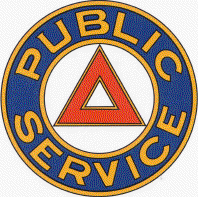|
Newark Public Service Terminal
The Public Service Terminal was a three-level streetcar station in Newark, New Jersey, owned and operated by the Public Service Corporation, adjacent to the Hudson and Manhattan Railroad's Park Place station. It served as the terminus for streetcar lines from as far as Trenton. Public Service was both a transportation company and a utility, providing electric and gas service to much of northern New Jersey. The six office stories above the terminal served as company headquarters. The terminal, opened on April 30, 1916 was located at the northeast corner of Park Place and Raymond Boulevard at Military Park, a few blocks away from the busy downtown crossing at Broad and Market Streets. It provided an off-street terminal for streetcars, and a central location for riders. The street entrance was between the two track levels, and provided access to the office floors and to both terminals. Most cars used the upper level, reached by a ramp from Mulberry Street on the east side. ... [...More Info...] [...Related Items...] OR: [Wikipedia] [Google] [Baidu] |
Electric Railway Journal (1916) (14756262944) (cropped)
Electricity is the set of physical phenomena associated with the presence and motion of matter that has a property of electric charge. Electricity is related to magnetism, both being part of the phenomenon of electromagnetism, as described by Maxwell's equations. Various common phenomena are related to electricity, including lightning, static electricity, electric heating, electric discharges and many others. The presence of an electric charge, which can be either positive or negative, produces an electric field. The movement of electric charges is an electric current and produces a magnetic field. When a charge is placed in a location with a non-zero electric field, a force will act on it. The magnitude of this force is given by Coulomb's law. If the charge moves, the electric field would be doing work on the electric charge. Thus we can speak of electric potential at a certain point in space, which is equal to the work done by an external agent in carrying a unit of ... [...More Info...] [...Related Items...] OR: [Wikipedia] [Google] [Baidu] |
PSE&G 2
The Public Service Enterprise Group (PSEG) is a publicly traded diversified energy company headquartered in Newark, New Jersey and was established in 1985 with a legacy dating back to 1903. The company's largest subsidiary is Public Service Electric and Gas Company (PSE&G). The Public Service Electric and Gas Company is a regulated gas and electric utility company established in 1928 serving the state of New Jersey and it is New Jersey's oldest and largest investor owned utility company; it was originally a subsidiary of the New-Jersey-based Public Service Corporation. History PSE&G/PSEG origins date back to 1903 with the defunct Public Service Corporation. Public Service Electric and Gas Company The Public Service Electric and Gas Company, commonly referred to as PSE&G, is the primary subsidiary of the Public Service Enterprise Group (PSEG) and was established in 1928. The Public Service Corporation was formed in 1903 by combining more than 400 gas, electric and transportati ... [...More Info...] [...Related Items...] OR: [Wikipedia] [Google] [Baidu] |
1938 Disestablishments In New Jersey
Events January * January 1 ** The new constitution of Estonia enters into force, which many consider to be the ending of the Era of Silence and the authoritarian regime. ** State-owned railway networks are created by merger, in France (SNCF) and the Netherlands (Nederlandse Spoorwegen – NS). * January 20 – King Farouk of Egypt marries Safinaz Zulficar, who becomes Queen Farida, in Cairo. * January 27 – The Honeymoon Bridge at Niagara Falls, New York, collapses as a result of an ice jam. February * February 4 ** Adolf Hitler abolishes the War Ministry and creates the Oberkommando der Wehrmacht (High Command of the Armed Forces), giving him direct control of the German military. In addition, he dismisses political and military leaders considered unsympathetic to his philosophy or policies. General Werner von Fritsch is forced to resign as Commander of Chief of the German Army following accusations of homosexuality, and replaced by General Walther vo ... [...More Info...] [...Related Items...] OR: [Wikipedia] [Google] [Baidu] |


